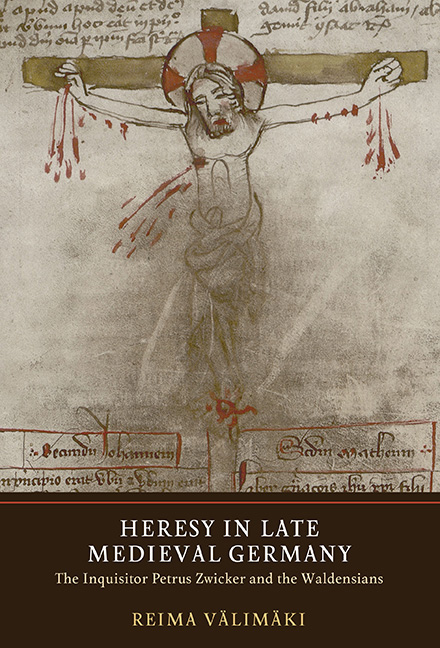Book contents
- Frontmatter
- Dedication
- Contents
- List of Illustrations
- Author's Note
- Acknowledgements
- List of Abbreviations
- Introduction
- 1 Petrus Zwicker and the Career of an Inquisitor at the Turn of the Fifteenth Century
- 2 The Inquisitor Writes
- 3 The Inquisitor's Practice and his Legacy
- 4 Communicating Faith
- 5 The Dissidents, the Clergy and the Church
- Epilogue: The Consolation of Inquisition
- Appendix 1 Manuscript Descriptions
- Appendix 2 Chapters and Titles of the Cum dormirent homines according to Jacob Gretser (1613/77)
- Appendix 3 The Circulation of the Processus Petri together with the Cum dormirent homines
- Appendix 4 Inquisitors' Manuals of St Florian and Linz
- Appendix 5 Collation of Formularies in St Florian, MS XI 234 and Würzburg, UB MS M. ch. f. 51
- Bibliography
- Index
- YORK MEDIEVAL PRESS: PUBLICATIONS
1 - Petrus Zwicker and the Career of an Inquisitor at the Turn of the Fifteenth Century
Published online by Cambridge University Press: 26 March 2019
- Frontmatter
- Dedication
- Contents
- List of Illustrations
- Author's Note
- Acknowledgements
- List of Abbreviations
- Introduction
- 1 Petrus Zwicker and the Career of an Inquisitor at the Turn of the Fifteenth Century
- 2 The Inquisitor Writes
- 3 The Inquisitor's Practice and his Legacy
- 4 Communicating Faith
- 5 The Dissidents, the Clergy and the Church
- Epilogue: The Consolation of Inquisition
- Appendix 1 Manuscript Descriptions
- Appendix 2 Chapters and Titles of the Cum dormirent homines according to Jacob Gretser (1613/77)
- Appendix 3 The Circulation of the Processus Petri together with the Cum dormirent homines
- Appendix 4 Inquisitors' Manuals of St Florian and Linz
- Appendix 5 Collation of Formularies in St Florian, MS XI 234 and Würzburg, UB MS M. ch. f. 51
- Bibliography
- Index
- YORK MEDIEVAL PRESS: PUBLICATIONS
Summary
Petrus Zwicker was an exceptionally successful inquisitor and polemicist, but he was an unlikely man to become an inquisitor. He was not a Dominican or Franciscan friar, to whom the inquisition of heresy was commonly entrusted; neither was he a secular cleric or a canon regular, whose pastoral obligations made them suitable for the task. He was a Celestine monk from the monastery of Oybin, founded by Emperor Charles IV in 1369, and between 1394 and 1404 he was the provincial of the order in Germany. The German province of the Celestines, consisting only of the monastery in Oybin and a smaller house in Prague, came into being as a result of the Schism. It was created under the Italian main monastery of S. Spirito del Morrone in order to prevent the German Celestines from slipping under the influence of the French party in the order.
The Celestines were an eremitic order founded by Pietro da Morrone in the mid-thirteenth century. They came to prominence after their founder was unexpectedly nominated as Pope Celestine V in an odour of sanctity in July 1294, his rapid resignation after five months in office and his death in 1296. He was canonized in 1313, and soon after this the Celestines acquired their name. They were supposed to exclude themselves from the world and secular tasks, and their constitutions strictly regulated the acceptance of assignments from outsiders, with the exception of those ordered by kings and cardinals. Even then the service could be continued beyond three years only with the permission of the general chapter. Therefore it is no wonder that Petrus Zwicker and Nikolaus von Wartenberch, who assisted Zwicker in Stettin, are the only Celestines known to have held the office of inquisitor of heresy. (Whilst the practice of inquisition into heresy is particularly associated in modern scholarship with the Dominican order, it should be noted that, from its inception, it was a tool wielded by Franciscans, bishops and secular priests as well.)
As there are no letters of commission surviving from Zwicker's first known duty as inquisitor in Erfurt 1391, it is impossible to know by whose orders Zwicker first assumed the office of inquisitor, but a connection to the archbishop of Prague, Jan of Jenštejn, is probable.
- Type
- Chapter
- Information
- Heresy in Late Medieval GermanyThe Inquisitor Petrus Zwicker and the Waldensians, pp. 22 - 37Publisher: Boydell & BrewerPrint publication year: 2019

